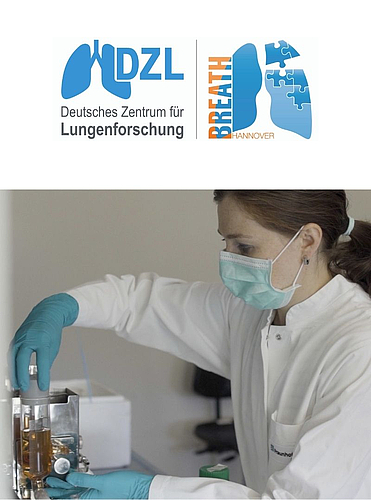A committee of experts makes the decisions on the financing of the applications submitted for the DZL’s own sponsorship program of clinical studies. In the current round of applications, four studies have now been approved, in two of which researchers from the BREATH site in Hannover are involved. The sponsored studies reflect the wide spectrum of the DZL: this includes new therapies for bronchiectasis, non-small cell lung cancer and chronic transplant failure, as well as the establishment of a screening program for lung cancer.
Study on the eradication of Pseudomonas aeruginosa in bronchiectasis - ERADICATE Study
Chronic Pseudomonas aeruginosa (PA) infection presents a particular problem for the course of bronchiectasis cases as it is connected with an increase in morbidity and mortality. Thus, in clinical practice, a PA eradication approach is often carried out on first evidence. However, up to now there has been insufficient verification for this procedure and, in addition, the therapies are often carried out off-label.
Researchers at the DZL sites in Munich (CPC), Hannover (BREATH) and Giessen/Marburg (UGMLC) are convinced that prevention of a chronification of the PA infection is important for the further clinical course of a case of bronchiectasis. With the aid of a co-funding by the Pari company, the effect of an eradication trial with a 4-week therapy with inhaled colistin will now be investigated. The randomized study should provide a reliable data basis for the eradication therapy of an early PA infection in bronchiectasis.
Study to establish early detection of lung cancer - Hanse Study
Studies in the USA and Europe show that the mortality rates of lung cancer can be significantly reduced by early detection. Scientists at the DZL sites of the Airway Research Center North (ARCN) and Hannover (BREATH) predict that lung cancer screening using low-dose computer tomography (LDCT) after a positive evaluation by the Institute for Quality and Efficiency in Health Care (Institut für Qualität und Wirtschaftlichkeit im Gesundheitswesen, IQWiG) is also possible in Germany and could be covered by the statutory health insurance.
Co-financed by AstraZeneca, the HANSE Study is designed to investigate unresolved issues in a quality controlled lung cancer screening program, such as, for example, defining and addressing the risk population and the cost efficiency. In addition, the effect of further markers extracted from the LDCT, such as emphysema and coronary calcium scores, on the health of the lungs and heart will be studied.
Study on preoperative immunotherapy in non-small cell lung cancer (NSCLC) - The Neomun Trial
The Neomun Trial is a shared project between the Heidelberg (TLRC) and Giessen/Marburg (UGMLC) sites. In a non-randomized Phase II study, the Thorax Clinic Heidelberg and the Max Planck Institute for Heart and Lung Research are studying how a neoadjuvant anti-PD-1 immunotherapy in patients with non-small cell lung cancer (NSCLC) affects the tumor response as a function of the tumor immune signature. The study is co-financed by the MSD (Merck Sharp & Dohme) Investigator Initiated Studies Program as well as the NCT PoCT (National Clinical Trial Point-of-Care Testing) Program.
Over a period of three years, 30 patients undergoing a Pembrolizumab therapy prior to surgical tumor removal were compared with 30 patients without prior immunotherapy. The feasibility, safety and efficiency of this therapeutic option will be evaluated based on its effect on the clinical and pathogical tumor reaction. At the same time, the researchers want to analyze potential prognostic biomarkers and the functionality of the anti PD-1 therapies in the neoadjuvant context in operable NSCLC.
Study on the early recognition and prevention of transplant failure - CatBOS
Bronchiolitis obliterans syndrome (BOS) is the main cause of chronic lung allograft dysfunction (CLAD) after lung transplantation. Researchers at the DZL site in Munich (CPC) have discovered that the activity of the enzyme cathepsin B is clearly increased in BOS sufferers. Together with the Giessen/Marburg site (UGMLC), these scientists now wish to investigate whether this enzyme could provide a therapeutic approach to prevent the advance of BOS.
Until 2023, patients will be examined in two stages after lung transplantation. Firstly, the enzyme activity of lung transplant patients operated between 2013 and 2015 will be observed retrospectively, and then follow-up visits will be made to validate the results of current lung transplantations. The aim is to facilitate in this way an early diagnosis of BOS and thus improve the long-term survival of transplant patients.
Text: BREATH/ AB
Photo: DZL
